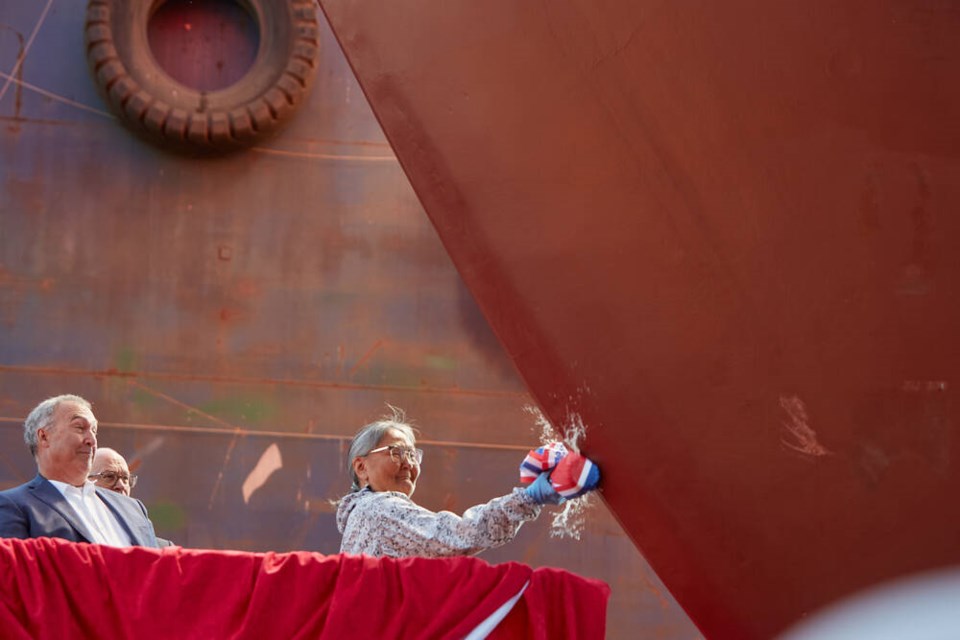Colossal, crimson and polished to glassy effect, the CCGS Naalak Nappaaluk is prepossessing as far as marine crafts go, but the Canadian Coast Guard’s new flagship science vessel is more than just a pretty face.
The Offshore Oceanographic Science Vessel (OOSV), the fourth ship to be launched by Seaspan under its National Shipbuilding Strategy, was launched into local waters at an opening ceremony on Saturday at the North Vancouver Shipyards.
With an on-board computer, marine mammal observation station, ocean sampling room, oceanographic winch and permanent and portable labs, the ship will serve as a primary research tool for Fisheries and Oceans Canada.
It is essentially a “floating laboratory,” said Robert Wight, the director general of vessel procurement at Fisheries and Oceans Canada.
“All the equipment on board means we can go tens of metres down into the silt at the bottom of the ocean, take a core, bring that up, lay that out on the deck of the ship and examine it right there and then,” he said.
One of the vessel’s main purposes will be to track ocean conditions as they change through climate change, and how those impacts might affect fish populations, habitats, and the broader deep sea food webs, said Wight.
“Much like our other fisheries vessels, the information will be used to guide our sustainable and responsible marine policies,” he said.
The ship, named after a Nunavik Elder renowned for his championing of the Inuit language and culture, can also carry out search and rescue operations and environmental response when needed.
At 88 metres long and 17.6 metres wide, the vessel is the same size as its predecessor – the venerable CCGS Hudson, the longest-serving ship in the Canadian Coast Guard fleet – but “much more capable” in terms of tools that it possesses, said Wight.
“For the very first time, at the flick of a switch, we are able to map the bottom of the ocean as we move forward,” he said. “There are all sorts of discoveries to be made.”
Over the coming months the vessel will linger in local waters as its inhabitants get accustomed to the new space, with small missions penned for around Vancouver Island.
Full scale research projects will officially kick off at the end of next year and into 2026, with the ship’s 60-strong contingent – 34 crew and 26 scientists – ready to be shipped anywhere from the Northern to the Southern Atlantic.
John McCarthy, Seaspan Shipyards CEO, said the launch of the vessel, Canada’s largest and most modern, is a “historic day” for the country and the work being carried out to support ocean research.
“I am so proud of the innovation and dedication that went into building this important ship that will help deepen our understanding of the oceans that Canadians depend on for food, our livelihoods and the health of our country,” he said.
Guests attending the official event at the Shipyards on Saturday celebrated its launch alongside Qiallak Nappaaluk, Nalaak Nappaaluk’s daughter, who christened the vessel as the ship’s sponsor.
Those in attendance were also able to take a piece of history home via specially designed commemorative coins crafted by səlilwətaɬ (Tsleil-Waututh) artist Olivia George. Titled Protection and Knowledge, the coins marked the milestone with images that represented the land, sun, waters and local ecosystem.
Mina Kerr-Lazenby is the North Shore News’ Indigenous and civic affairs reporter. This reporting beat is made possible by the Local Journalism Initiative.



